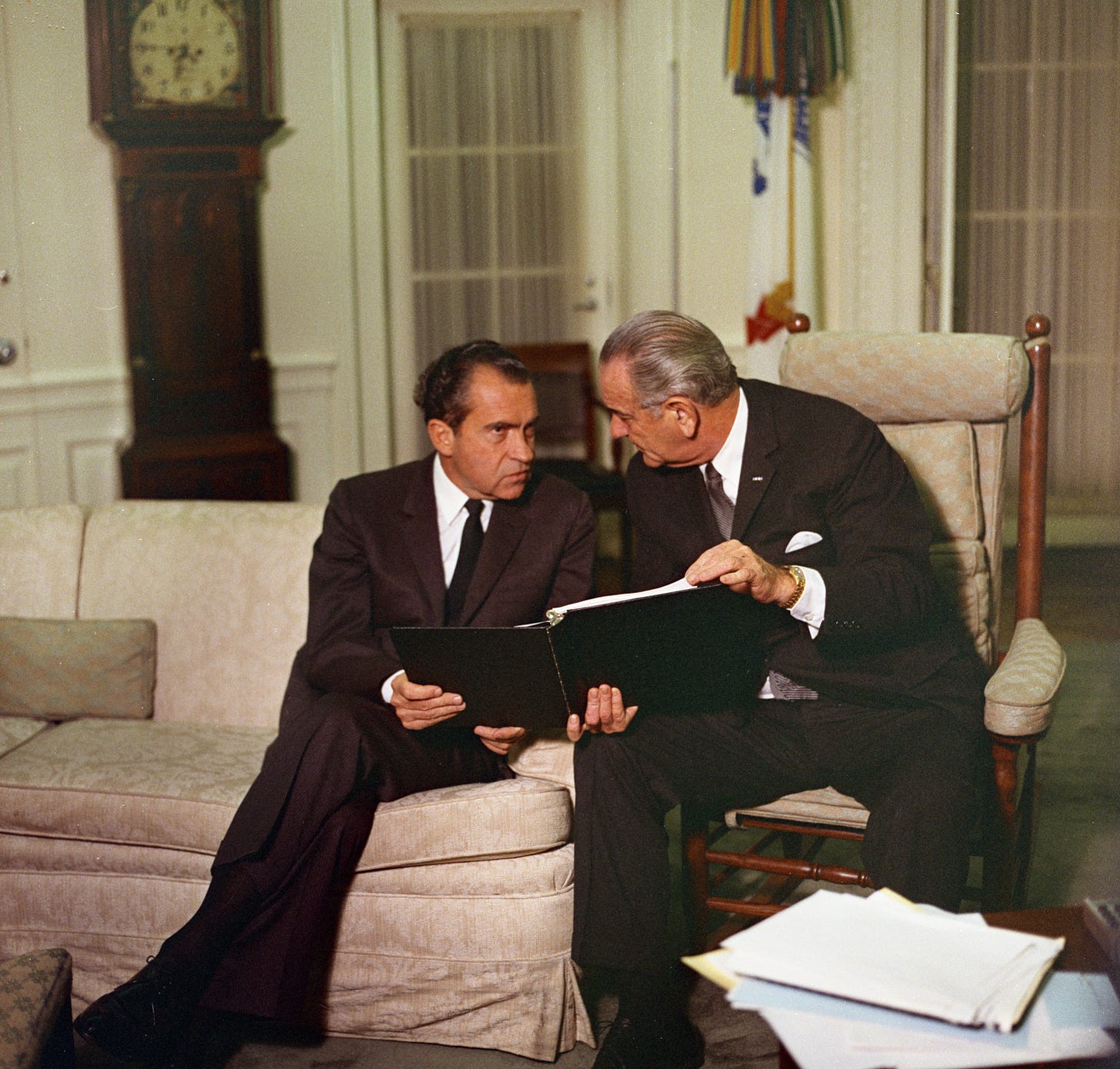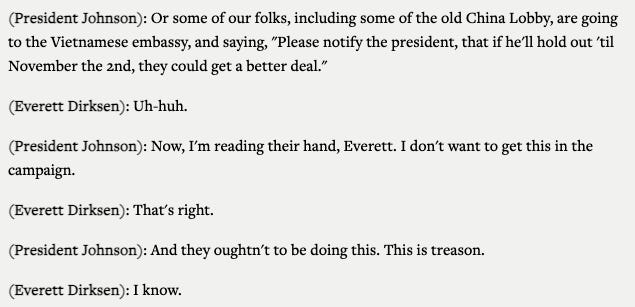Nixon and the Chennault Affair
Nixon: a Life by John A. Farrell
This post was based on Nixon: a Life by John A. Farrell
The year is 1968 and Nixon is running for President (again).
After two terms as Vice President under the venerated WWII hero General Eisenhower, Nixon won the GOP nomination in 1960. However, he lost against the Democratic Senator John F. Kennedy . Later he would get further humiliated after running for Governor of California in 1962 and losing.
History would change its course when just hours after Nixon left Dallas, JFK and his VP Lyndon B. Johnson would arrive as part of their official visit to Texas. JFK would be slain by an assassin’s bullet elevating LBJ whose escalation of the Vietnam War would provide an opening for Nixon’s political resurrection.
LBJ with his newfound powers would pass sweeping domestic legislation such as the Civil Rights Act of 1964 and declare an unconditional war on poverty through his Great Society Programs. These achievements led to his landslide victory in the 1964 election where he won the highest share of the popular vote in American history. However, his own term in office would be forever marred by his administration’s decision to double down on the war in Vietnam leading to tens of thousands of American deaths and millions of Vietnamese deaths. The war would consume his presidency, shattering not just his credibility but that of the office of the American President forever.
This unpopularity would lead LBJ to not seek his second term and drop out in 1968. He would endorse his VP Hubert Humphrey in his campaign to win the democratic nominee. The only other serious contender on the democratic side was JFK’s brother Robert F. Kennedy. However, RFK would also tragically get assassinated cementing Humphrey as the democratic nominee.
Now in 1968, Nixon again wins his party’s mandate to run for POTUS and despite his loss in 1960 (and his further humiliation in the 1962 California Gubernatorial Election), Nixon now had a decent shot at winning the November 5th election due to the failures of the Johnson administration in Vietnam.
In mid-October 1968, just three weeks before the election, Nixon learned of a new development in the Johnson administration’s dealings with Vietnam that worries him. He has moles in the administration (one of them being Henry Kissinger) and finds out there is an imminent announcement of a complete halt on bombing in North Vietnam and peace talks in Paris that could include South Vietnam.
Nixon realised that this announcement right before the election could lead to Humphrey winning as wins in the Johnson administration (of which Humphrey was VP) with regards to Vietnam would inadvertently get him more votes. While all sides were almost reaching a deal and an announcement of the upcoming peace talks becoming more of a reality, Nixon asks his staffers to get Anna Chennault to act as a secret intermediary to the South Vietnamese President Nguyen Van Thieu to tell him to boycott peace talks and promise better terms under a Nixon administration.
LBJ found out about this as he was using the NSA to secretly monitor communications between the South Vietnamese embassy and Saigon. Moreover, the FBI and CIA had Chennault under surveillance as well. LBJ privately calls this “treason” as he realises Nixon was secretly colluding with a foreign government to break down peace talks to win his election.
On the night of 31st October 1968, just five days before the election, LBJ stunned the nation by publicly announcing new breakthroughs in peace talks. Then Thieu abruptly withdrew from peace talks after previously agreeing to them and creating a massive diplomatic crisis days before the election.
Nixon and Johnson would correspond over the next few days and through these conversations that were released as part of the Presidential Tapes, we get to see a glimpse of the actual humans behind these two political machines. LBJ knows that Humphrey has already lost with the behind the scenes manoeuvring of Nixon but tries to tell him that he knows what happened and tries to move past it because neither of them can admit to what transpired—colluding with foreign leaders in the middle of a war and secretly taping allied embassies.
On November 5th 1968, Nixon narrowly defeated Humphrey by just 0.7% of the popular vote (less than 500,000 votes) and the Vietnam war would prolong for years until Kissinger and Nixon would work together to finally end it.
This episode would not be revealed until Presidential tapes were declassified especially after Nixon’s more egregious covering up of the Watergate scandal. LBJ decided not to leak this information despite knowing about this to not further undermine confidence in the office of the President and because he didn’t want to reveal that the NSA, CIA and FBI had been collecting all this information and feeding it to him.
Farrell argues that even by late October 1968, with the election looming just days away, peace was unlikely given the incompatible agendas of Saigon and Hanoi, the chances for peace in the fall of 1968 were overrated anyways. However, historians in general agree that the election could have been tipped over to Humphrey had the peace talks not been broken so abruptly due to “seating arrangement disagreements” by South Vietnam.
There are so many moments in Nixon’s life which are pure shakespearean in its drama and the fact that he is the only American president to resign from office (otherwise he would have easily been removed from office by the Senate) just adds to his lore. However, I find this incident fascinating because not only does it link war and elections but it does so in a very simple and direct manner. I wonder how much manoeuvring there is behind the scenes for peace talks with the more well known wars of our era today and who is running around with orders from political leaders trying to garner votes in exchange for delaying or announcing peace talks that could potentially lead to a ceasefire. It’s all so fascinating.



